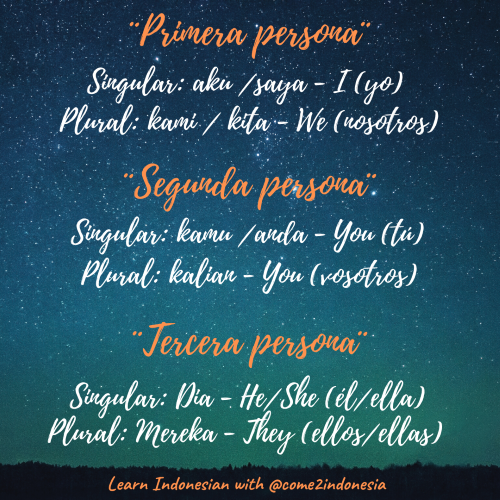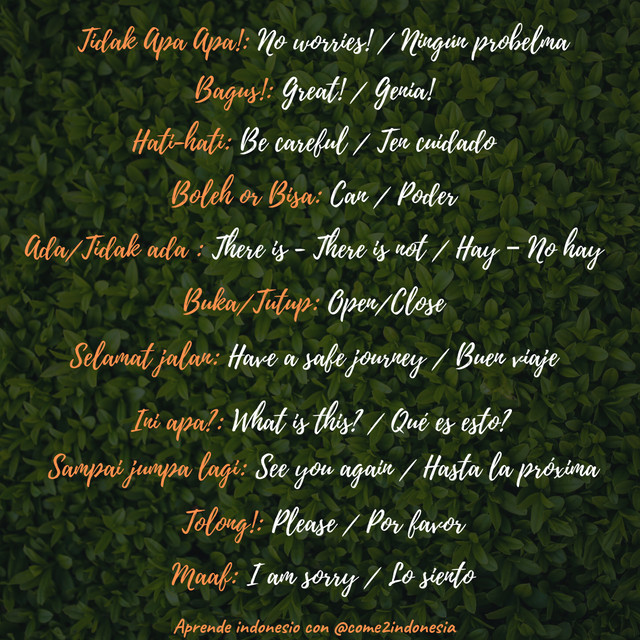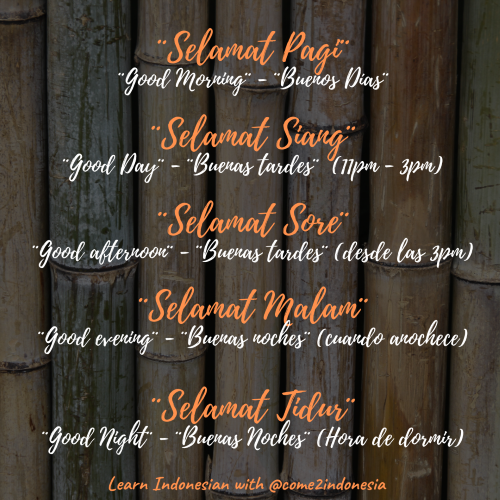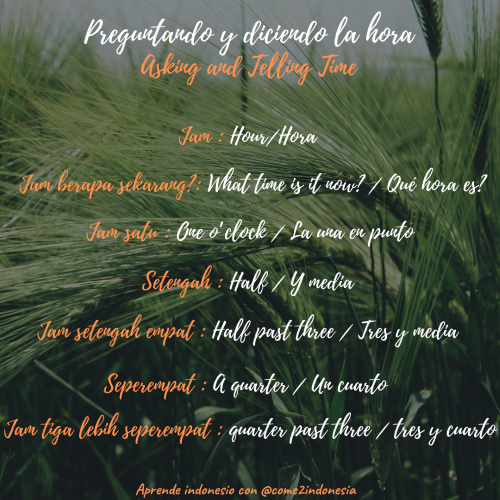Welcome to our second class of Bahasa Indonesia! In our first class (Lesson 1 – Introduction), you had the opportunity to know the origins of the language, learn your first words in the Indonesian language and see some of the best practices for studying the Indonesian language. In this class, we will study some examples of basic vocabulary and simple sentences in Bahasa. Once you get to understand them, you’ll discover how simple and quick it can be to learn the Indonesian language!
The first step in learning Indonesian is to know and understand the common vocabulary in the Bahasa language.
Here are some commonly used words and expressions in daily conversations, which can be a good start if you want to learn the Indonesian language easily and understandably. I’m sure you’ll hear them and use them very often during your trip in Indonesia.
As you know, personal pronouns are used to replace a subject in a sentence. Here’s a brief explanation of the list of Indonesian personal pronouns in the photo.

1. First Person
The pronoun “aku” is widely used in an informal situation, while the pronoun “saya” is more likely to be used in a formal situation or when talking to an older person or with a higher position (in a company) than you.
The pronoun “kami” is used when the person you’re talking to is not included in the context. In contrast, the pronoun “kita” is used to express that the person you’re talking to is also included.
2. Second Person
Similar to using “saya” and “aku”, “anda” and “kamu” are being used in two different contexts. The formal one is “anda”, and the informal one is “kamu”.
3. Third Person
The pronoun “dia” is used in an informal situation while the pronoun “beliau” is used in a more formal situation. The pronoun “beliau” also indicates that the person being replaced by this pronoun has a higher state or a higher position than the speaker.
| Bahasa Indonesia | English | Notes |
|---|---|---|
| SAYA/AKU | I, ME | |
| ANDA/KAMU | YOU | |
| DIA | HE/SHE, HIM/HER | It can be used for men and women. |
| KAMI/KITA | WE, US | |
| MEREKA | THEY, THEM | |
| INI/ITU | THIS/IT, THAT | “Itu” is used to describe things or to make a fictional subject. |
| BAPAK/TUAN | MISTER, SIR | |
| IBU/NYONYA | MADAM, MISTRESS | |
| AYAH/BAPAK | FATHER | |
| IBU/BUNDA | MOTHER | |
| ANAK | CHILD | |
| ANAK-ANAK | CHILDREN | |
| ANAK LAKI-LAKI | SON | |
| ANAK PEREMPUAN | DAUGHTER | |
| KAKEK | GRANDFATHER | |
| NENEK | GRANDMOTHER | |
| KAKAK LAKI-LAKI/PEREMPUAN | OLDER BROTHER/SISTER | |
| ADIK LAKI-LAKI/PEREMPUAN | YOUNGER BROTHER/SISTER |
It is true that, in the most touristic cities, most Indonesians can speak basic English. However, speaking the language will make your trip much more authentic.
You can ask for directions more easily, negotiate prices, better understand the culture and mingle with the locals. You will show that you have a great interest in local people and their culture. And Indonesians love it when tourists can speak their language!
Here are some common Indonesian phrases that will help you in daily conversations:
| BAHASA INDONESIA | Spanish |
|---|---|
| PERMISI | EXCUSE ME |
| APA KABAR? | HOW ARE YOU? |
| BAIK/KURANG BAIK | GOOD/NOT SO GOOD |
| BOLEHKAH SAYA BERTANYA? | MAY/CAN I ASK YOU SOMETHING? |
| SIAPA NAMA KAMU? | WHAT’S YOUR NAME? |
| NAMA SAYA FERNANDO | MY NAME IS FERNANDO |
| DI MANA KAMU TINGGAL? | WHERE DO YOU LIVE? |
| SAYA TINGGAL DI BALI | I LIVE IN BALI |
| SENANG BERTEMU KAMU | NICE TO MEET YOU |
| SAYA TIDAK MENGERTI | I DON’T UNDERSTAND |
| APAKAH KAMU BISA BERBAHASA INGGRIS? | CAN YOU SPEAK ENGLISH? |
| SAYA TIDAK BISA BICARA BAHASA INDONESIA | I DON’T SPEAK INDONESIAN |
| TOLONG BICARA PELAN-PELAN | PLEASE SPEAK SLOWER |
| TERIMA KASIH | THANK YOU |
| SAMA-SAMA | YOU ARE WELCOME |
Then try to memorize the following expressions in Indonesian Bahasa so that you can use them in your day-to-day life and better relate to the local people.

Let’s go over the expressions in the photo once again:
✔️ Tidak Apa Apa!: No problem
✔️ Bagus!: Good!
✔️ Hati-hati: Be careful
✔️ Boleh or Bisa: Can
✔️ Ada/Tidak ada : There is – There is no
✔️ Buka/Tutup: Open/Close
✔️ Selamat jalan: Have a safe journey
✔️ Ini apa?: What is this?
✔️ Sampai jumpa lagi: Until next time, see you
✔️ Tolong!: Please, help
✔️ Maaf: I’m sorry
✔️ Jam berapa sekarang?: What time is it now?
▶️ Watch this video about “The 25 Best Phrases in Indonesian” to get acquainted with pronunciation.
In continuation, we will learn the expressions used to greet during the respective hours of the day. As you will see, all of them use the word “selamat” which could literally be translated as being safe or congratulations. Subsequently, another word is added depending on the time of the day.

Easy, isn’t it? Then memorize them because we assure you that you will use them a lot in your day to day traveling in Indonesia!
| BAHASA INDONESIA | Spanish |
|---|---|
| SELAMAT PAGI | GOOD MORNING |
| SELAMAT SIANG | GOOD AFTERNOON (11AM-3PM) |
| SELAMAT SORE | GOOD AFTERNOON (3PM-6PM) |
| SELAMAT MALAM | GOOD EVENING (6PM-11PM) |
| SELAMAT TIDUR | GOOD NIGHT (TO GO TO SLEEP) |
| SAMPAI JUMPA | GOODBYE |
| SAMPAI JUMPA LAGI | SEE YOU LATER |
| SELAMAT JALAN | GOODBYE (TO THE PERSON LEAVING) |
| SELAMAT TINGGAL | GOODBYE (TO THE PERSON STAYING) |
| SELAMAT MAKAN | ENJOY YOUR FOOD |
| SELAMAT ULANG TAHUN | HAPPY BIRTHDAY |
| SELAMAT! | CONGRATULATIONS! |
| SELAMAT DATANG | WELCOME |
Counting in Indonesian is a fundamental aspect of speaking the language. The Indonesian counting system is extremely simple and regular, perhaps more than the vast majority of systems around the world.
Indonesians use Arabic numerals that are widely seen around the world, even in traditional writing such as Javanese or Balinese. Only on the most formal occasions or rituals, you will have the opportunity to see the numbers written in traditional letters, so we will not study them here.
To count in Indonesian, basically only the words of the first 10 numbers are combined to form the highest numbers. Let’s start with the basics, the numbers from zero to 20, and then let’s go up. You’ll notice that once you reach 12, the word “belas” is simply added to the base number.
Here’s how to count in Indonesian:
| BAHASA INDONESIA | Spanish |
|---|---|
| NOL | Zero |
| SATU | One |
| DUA | Two |
| TIGA | Three |
| EMPAT | Four |
| LIMA | Five |
| ENAM | Six |
| TUJUH | Seven |
| DELAPAN | Eight |
| SEMBILAN | Nine |
| SEPULUH | Ten |
| SEBELAS | Eleven |
| DUA BELAS | Twelve |
| TIGA BELAS | Thirteen |
| EMPAT BELAS | Fourteen |
| LIMA BELAS | Fifteen |
| ENAM BELAS | Sixteen |
| TUJUH BELAS | Seventeen |
| DELAPAN BELAS | Eighteen |
| SEMBILAN BELAS | Nineteen |
| DUA PULUH | Twenty |
| DUA PULUH SATU | Twenty |
| SERATUS | Hundred |
| SERIBU | Thousand |
| SATU JUTA | One million |
Having learned to say greetings at different times of the day and once we have studied the numbers in Indonesian, we will now learn how to say the time in Indonesian Bahasa:
It is very important to learn how to say and ask the time in any language, since we cannot go wrong in terms of time and schedules; such as flight departure or arrival times, meeting times, etc.

Let’s go over the expressions in the photo once again:
✔️ Jam: Time
✔️ Jam berapa sekarang?: What time is it now?
✔️ Jam satu tepat: One o’clock
✔️ Setengah: A half
✔️ Jam setengah empat: Three and a half
✔️ Seperempat: A quarter
✔️ Jam tiga lebih seperempat: Three and a quarter
Now we will see some examples of useful phrases asking the time that we can use during our trip through Indonesia:
| BAHASA INDONESIA | Spanish |
|---|---|
| JAM BERAPA PESAWAT/BIS/KERETA API BERANGKAT? | WHAT TIME DOES THE PLANE/BUS/TRAIN LEAVE? |
| PESAWAT/BIS/KERETA API BERANGKAT JAM 09.00 | PLANE/BUS/TRAIN DEPARTS AT 9.00 |
| JAM BERAPA PESAWAT/BIS/KERETA API DATANG? | WHAT TIME DOES THE PLANE/BUS/TRAIN ARRIVE? |
| PESAWAT/BIS/KERETA API DATANG JAM (8.00) | PLANE/BUS/TRAIN ARRIVES AT 8.00 |
| JAM BERAPA MUSIUM/TOKO/KANTOR BUKA? | WHAT TIME DOES THE MUSEUM/STORE/OFFICE OPEN? |
| JAM BERAPA MUSIUM/TOKO/KANTOR TUTUP? | WHAT TIME DOES THE MUSEUM/STORE/OFFICE CLOSE? |
In the next lesson we will study vocabulary of travel. Don’t miss it!
Remember that you can also write to [email protected] if you need help planning your trip to Indonesia.
Based in Ubud
Ulun Danu Bratan Temple
Jatiluwih rice fields
Mother Temple Besakih
Tanah Lot Temple
3 nights in Ubud
3 Nights stay in Gili Trawangan
2 nights in Candidasa
Travel with transfers included
Island of the Gods
5 nights in Ubud
3 Nights stay in Seraya
3D2N Borneo Orangutan Tour based with private klotok
Travel with transfers included
Island of the Gods
4 nights in Ubud
3D2N Yogyakarta Tour with Private Guide
3D2N Borneo Orangutan Tour based with private klotok
Travel with transfers included
Island of the Gods
5 nights in Ubud
2 Days Bali Tour with Private Guide
3D2N Borneo Orangutan Tour based with private klotok
Travel with transfers included
Island of the Gods
4 nights in Ubud
3 nights in Uluwatu
1X Half Day Tour Uluwatu and Kecak Dance
Travel with private guide
Island of the Gods
Born in Valencia (Spain), his professional career has always revolved around the tourism sector. He studied tourism degree and later specialized in digital tourism marketing.
After working in various travel agencies. In 2018, he was a beneficiary of an Indonesian government scholarship to study at one of the most prestigious universities in the country. After specializing in the destination and having traveled and lived in various areas of Indonesia, he joined our team in early 2020.
Fernando is passionate about surfing and extreme sports. He’s the first to sign up for a trip, always looking for new adventures!
SHARE THE POST WITH FRIENDS